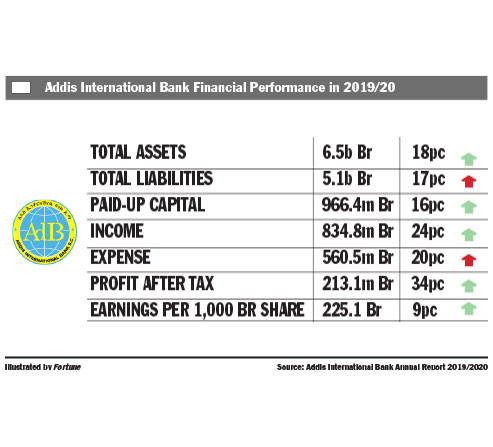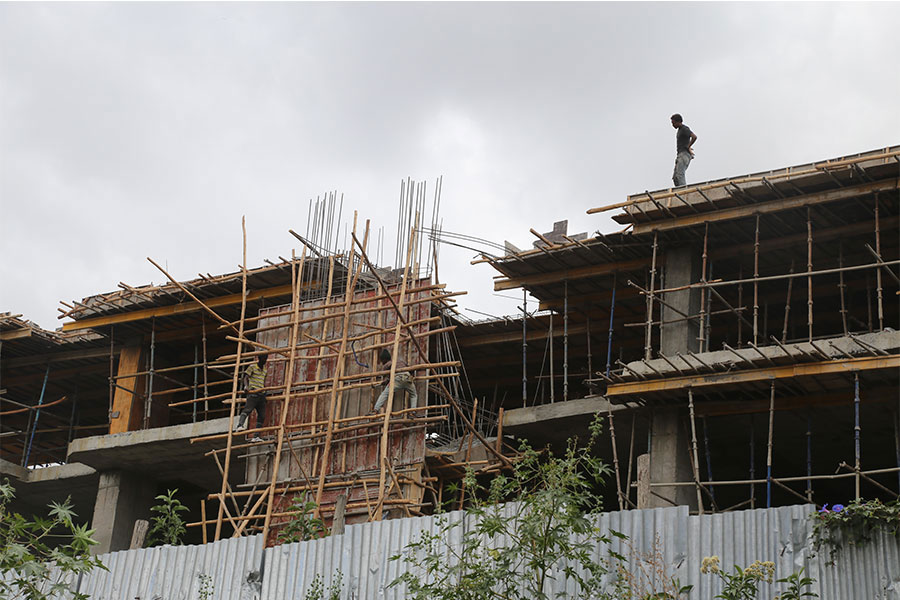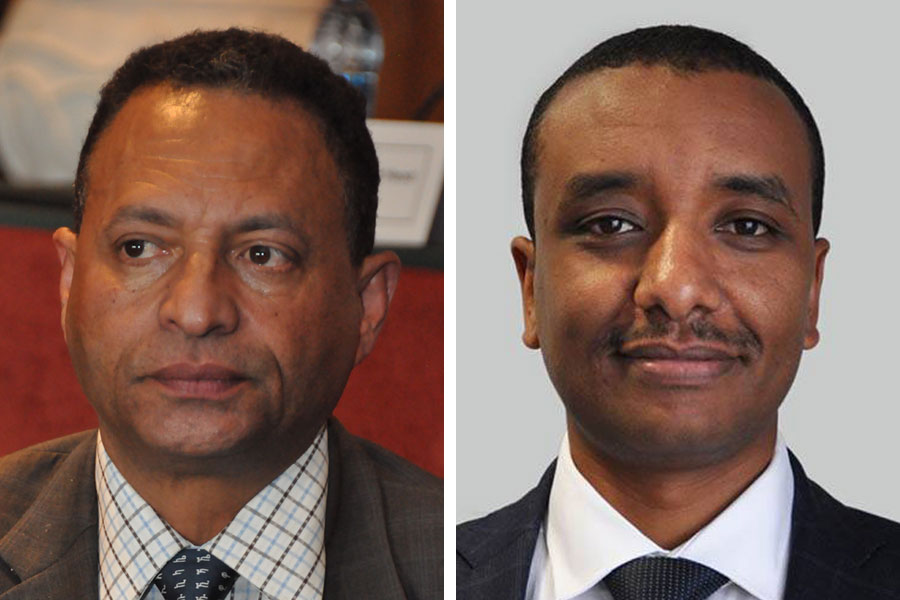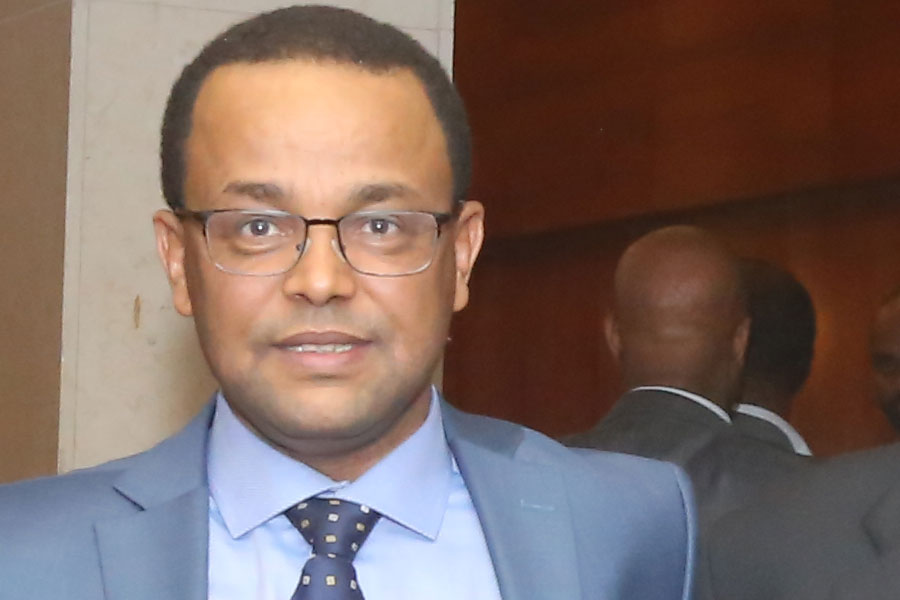
Commentaries | Aug 02,2025
Ahadu Bank, one of the youngest financial institutions in the market, has made a noteworthy recovery from substantial losses during its founding years, posting a net profit of 90.9 million Br in the fiscal year 2023/24. The turnaround came after the Bank absorbed a hefty loss of 193.68 million Br the previous year.
For Sefialem Liben, the Bank's president, the story is not so much about the amount of profit as it is about how it was achieved in the face of several policy changes. The National Bank of Ethiopia's (NBE) lending cap “severely affected new entrants” like Ahadu, constraining their ability to expand loan portfolios. It compelled many in the industry to seek alternative strategies to generate income and control costs.
A strategic shift toward non-lending activities and stringent cost management fueled Ahadu Bank's recovery. Initially, the Bank had focused on aggressive resource mobilisation and loan disbursement, advancing about 800 million Br in loans in the first two months of the fiscal year. The Central Bank's sudden introduction of the credit growth cap forced a recalibration.
"We lobbied the regulators for special consideration while exploring new income streams," said Board Chairperson Anteneh Sebsibie.
Ahadu’s net interest income constituted 65pc of its total income (similar to the industry's average for the 10-year beginning in 2012), revealing reliance on interest-bearing activities as the primary revenue source. The Bank also doubled down on financial intermediation and non-financial services, doubling its total income to 1.1 billion Br. Interest on loans and advances, as well as other investments, soared to 371.64 million Br.
Commission and service charges jumped to 679.22 million Br, and gains on foreign exchange dealings surged to 89.06 million Br, a more than threefold increase from the previous year.
"The increase in all income items is very laudable," said Abdulmenan Mohammed (PhD), a London-based financial analyst.
The Bank doubled its total assets to 6.42 billion Br, with deposits surging by 129.5pc to 4.66 billion Br. Loans and advances increased by 90pc to 1.76 billion Br, although the loan-to-deposit ratio declined to 37.8pc from 45.6pc. The industry's loan-to-deposit ratio stood at 83.7pc by 2022. While the average loan-to-asset ratio was around 66.2pc, Ahadu Bank's posted 55pc.
Abdulmenan found the ratio "alarmingly low" and cautioned the Bank's executives to do more to increase it substantially.
The President differed. He believes the ratio meets Ahadu's policy and Central Bank’s requirements.
Expenses too rose sharply, climbing to over one billion Birr, a 150pc increase. Wage expenses increased by 153.3pc to 489.98 million Br, and other operating expenses went up by 140.7pc to 350.1 million Br. Net interest expenses account for 40pc of total expenses, demonstrating the costs associated with the Bank's interest-bearing liabilities. Wages and administrative expenses represented 35pc of total expenses, revealing substantial operating costs related to staffing and administration.
"It's understandable considering the formative stage of the Bank," said Abdulmenan.
The Bank implemented a cost-optimisation strategy, suspending branch expansions.
"Our plan was much bigger," said Sefialem.
Despite the slowdown, Ahadu Bank, nonetheless, opened 29 new branches, bringing its total to 104, where average deposit reaching 44.23 million Br, with profit per employee at approximately 202,312 Br.
One of these branches is on Africa Avenue (Bole neighbourhood), managed by Fikreyesus Temesgen. He attributed their success to a favourable location and strong teamwork.
"Serving mostly corporate and SME clients, we've excelled in deposit mobilisation, customer acquisition, and share sales," he told Fortune. "Working on our initiatives and inclusivity is our plan for this year."
The Bank's earnings per share (EPS) climbed to 48 Br, a positive gesture for shareholders who had weathered the initial losses.
"The year represents a crucial milestone," said founding shareholder Tsegaye Jifar, who plans to increase his shareholding. "It sets a foundation for future trust in the Bank's capacity to generate sustainable profits."
Tsegaye is pleased with the financial performance and customer service.
"Customer service is plausible as well," he told Fortune.
Another founding shareholder, Alemayehu Argaw, voiced contentment with the Bank's performance and hopes it will improve its digital services while positioning ATMs in strategic locations.
"I'm planning to buy more shares," he said.
However, an accumulated loss of 144.26 million Br led to dividends being deferred for shareholders like Tsegaye and Alemayehu.
With over 30 years of experience in the financial industry, including stints at the Central Bank, Bank of Abyssinia, and the Development Bank of Ethiopia (DBE), Sefialem brought a wealth of expertise to his role. Armed with a postgraduate degree in management and business administration from Addis Abeba University, he is keen on steering Ahadu Bank toward growth.
Under Sefialem's managment, who took over from founding president Eshetu Fantaye, Ahadu Bank targeted long-term sustainability. Its cash and bank balances doubled to 2.05 billion Br, although these balances to total assets ratio slightly declined to 31.9pc from 32.8pc. According to Abdulmenan, the Bank should use its resource efficiency to generate more income.
Ahadu Bank began its journey three years ago boasting 503 million Br in paid-up capital, mobilised from 9,600 shareholders. It has increased from the previous year by 53.3pc to 1.03 billion Br. Non-distributable reserves of 998 million Br and a capital adequacy ratio of 56.7pc showed that the Bank had more than sufficient capital base.
"We've devised a strategy to increase capital and be competitive," Sefialem told Fortune.
According to Sefialem, while the road to meeting the Central Bank's capital threshold requirement is long, a merger is considered a last resort, contingent upon finding a company that shares the Bank's vision.
Ahadu Bank operates near the lower end of the industry, as it contends with giants that boast far greater capital and market share. The state-owned Commercial Bank of Ethiopia (CBE), a behemoth in the industry, posted a net income of 21.06 billion Br, accounting for over 36pc of total net income of 58.37 billion Br. Leading private banks such as Awash and Dashen banks reported net incomes of 8.13 billion Br and 5.07 billion Br, respectively.
Mid-sized competitors further unveil the disparity.
The Cooperative Bank of Oromia (Coop Bank) and United Bank, with net incomes of 2.96 billion Br and 2.92 billion Br, respectively, operate on a scale that grants them extensive branch networks, robust deposit bases, and substantial market sway. Newer banks, such as Tsehay Bank, posted net incomes of 126.14 million Br.
Ahadu Bank's net profit margin was 2.78pc; for every 100 Br in assets, the Bank generated approximately 2.78 Br in net profit, meeting the industry average. The analyst saw this as a modest return that signalled potential issues in asset utilisation and profitability. The asset-to-equity ratio of 6.12 (for every one Birr of equity, the Bank has 6.12 Br in assets) revealed a reliance on debt financing, which could pose risks if not managed prudently. The capital-to-asset ratio, the Bank's assets financed by shareholders' equity, a crucial metric for assessing financial stability and the capacity to absorb potential losses, was 16.34pc, three percentage points higher than the industry's average for the decade.
The Bank has allocated two percent of its total loans as provisions for bad loans, demonstrating a cautious approach to potential credit losses, given the competitive pressures and economic volatility.
There are signs of growth. Year-over-year increases in vital financial indicators show positive trends: total assets increased by 15pc, total loans grew by 12pc, total deposits rose by 18pc, and profit before tax experienced a noteworthy increase of 25pc. According to an analyst, these figures showed that Ahadu Bank is expanding.
PUBLISHED ON
Nov 24,2024 [ VOL
25 , NO
1282]

Commentaries | Aug 02,2025

Fortune News | Apr 03,2021

Radar | Oct 19,2019

News Analysis | Oct 27,2024

Fortune News | Jan 30,2021

Fortune News | Oct 02,2021

Fortune News | Aug 07,2021

Agenda | Aug 31,2019

Radar | Jan 01,2023

Fortune News | Dec 27,2018

Dec 22 , 2024 . By TIZITA SHEWAFERAW
Charged with transforming colossal state-owned enterprises into modern and competitiv...

Aug 18 , 2024 . By AKSAH ITALO
Although predictable Yonas Zerihun's job in the ride-hailing service is not immune to...

Jul 28 , 2024 . By TIZITA SHEWAFERAW
Unhabitual, perhaps too many, Samuel Gebreyohannes, 38, used to occasionally enjoy a couple of beers at breakfast. However, he recently swit...

Jul 13 , 2024 . By AKSAH ITALO
Investors who rely on tractors, trucks, and field vehicles for commuting, transporting commodities, and f...

Nov 1 , 2025
The National Bank of Ethiopia (NBE) issued a statement two weeks ago that appeared to...

Oct 25 , 2025
The regulatory machinery is on overdrive. In only two years, no fewer than 35 new pro...

Oct 18 , 2025
The political establishment, notably the ruling party and its top brass, has become p...

Oct 11 , 2025
Ladislas Farago, a roving Associated Press (AP) correspondent, arrived in Ethiopia in...